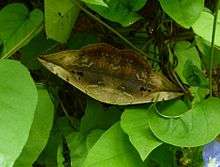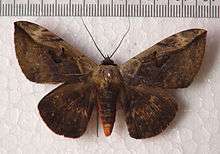Hypopyra vespertilio
Hypopyra vespertilio is a moth of the family Erebidae first described by Johan Christian Fabricius in 1787. It is found in China, Korea, Honshu in Japan, India (Maharashtra, Jammu and Kashmir, West Bengal), Sri Lanka, Nepal, Thailand, Myanmar, Cambodia, Vietnam, Taiwan, Malaysia, the Philippines, Java, Sumatra and Sulawesi.[2]
| Hypopyra vespertilio | |
|---|---|
 | |
| Hypopyra vespertilio, or a closely related species | |
 | |
| Scientific classification | |
| Kingdom: | Animalia |
| Phylum: | Arthropoda |
| Class: | Insecta |
| Order: | Lepidoptera |
| Superfamily: | Noctuoidea |
| Family: | Erebidae |
| Genus: | Hypopyra |
| Species: | H. vespertilio |
| Binomial name | |
| Hypopyra vespertilio | |
| Synonyms | |
| |
Description
The wingspan is 74–90 mm in male and 72–104 mm in female.[3] Male has minutely fasciculate antennae. Male with an erectile tuft of long hair from femur-tibial joint of forelegs. Tibia and hind tarsi not fringed with long hair, nor the hindwings clothed with long woolly hair on ventral side. The wings are grey suffused with slight fuscous brown. The forewings have the stigma usually reduced to spots or to two spots on discocellulars. The antemedial line is excurved below the costa then oblique to the inner margin. There is a double postmedial line, angled below the costa. The postmedial line is crenulate. The hindwings are fuscous brown with antemedial oblique lines. The medial and submarginal lines are crenulate and the inner margin is crimson. The darkest form is vespertilio which has the male dark brown; the costal and outer areas of forewing suffused with grey and olive; the stigma most developed; female much paler and greyer. The adult has been recorded as fruit-piercer.[4]
Ecology
The larvae feed on Albizia, Acacia, Wisteria and possibly Camellia species. They are pale grey.[5]
References
- Yu, Dicky Sick Ki. "Hypopyra vespertilio (Fabricius 1787)". Home of Ichneumonoidea. Taxapad. Archived from the original on January 16, 2019. Retrieved January 16, 2019.
- "Hypopyra unistrigata Guenée, 1852". Naturkundliches Informationssystem. Retrieved January 16, 2019.
- "變色夜蛾 Hypopyra vespertilio (Fabricius)". 驚奇山行 [Surprise mountain line]. May 21, 2009. Retrieved January 16, 2019.
- Hampson, G. F. (1894). The Fauna of British India, Including Ceylon and Burma: Moths Volume II. Taylor and Francis – via Biodiversity Heritage Library.
- Holloway, Jeremy Daniel. "Hypopyra Guenée". The Moths of Borneo. Retrieved October 4, 2019.
| Wikispecies has information related to Hypopyra vespertilio |
| Wikimedia Commons has media related to Hypopyra vespertilio. |